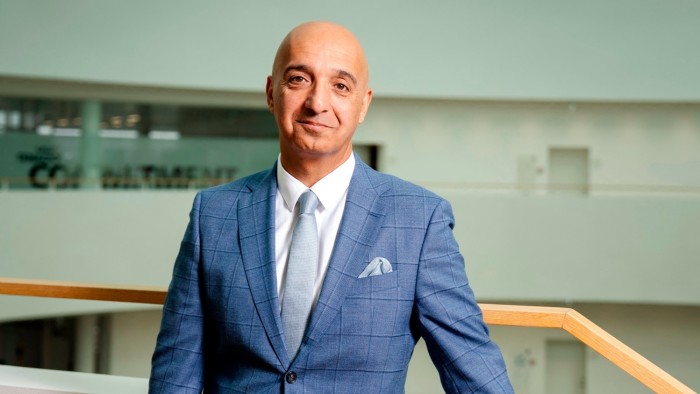Unlock the Editor’s Digest for free
Roula Khalaf, Editor of the FT, selects her favourite stories in this weekly newsletter.
Maziar Mike Doustdar thought he would just be doing the photocopying for a few months when he first took a summer job in the mailroom at Novo Nordisk, aged 21. More than 30 years later, he is in the top job at the Danish drugmaker after his predecessor was ousted in May.
His appointment was overshadowed by Novo’s announcement of steep cuts to sales and profit forecasts on the same day. Now, he has an onerous in-tray: to stop the company falling further behind in the lucrative American obesity medicines market, to tackle the problem of cheap US copycats of its drugs Ozempic and Wegovy, and to make cuts after years of ballooning costs.
His first major move was to announce plans to cut 11 per cent of jobs — employee numbers have increased almost 75 per cent in the past five years — for an estimated saving of $1.3bn a year. The resulting restructuring charges meant a further cut to its forecast for operating profit growth.
Markets gave a cautious welcome to his plan, with shares in Novo rising 3.7 per cent on the day Doustdar announced the restructuring.
Grégoire Biollaz, a senior investment manager at Novo shareholder Pictet, said it was “rational and well explained, rather than just a pure cost-cutting exercise simply to support the margins”.
Evan Seigerman, an analyst at BMO Capital Markets, said: “We applaud this bold restructuring.” But he added: “Still this is one step, we need to ultimately see concrete results.” Novo’s shares are still down more than 60 per cent in the past year.
Michael Novod, an analyst at Nordea Equities, said Doustdar was in a position to know how to reallocate money to spur growth. “When you hire 30,000 people in three and a half years, there may be a way forward to say OK, in certain areas we have too much fat, and reinvest it into more commercial operations.”
The choice of Doustdar surprised some investors, who had hoped Novo would bring in an outsider and someone with more experience in the crucial American market. Doustdar had been running commercial operations in all Novo’s markets outside the US.
Emily Field, an analyst at Barclays, said the choice was a “huge disappointment”. “The thing people wanted the most was somebody with US commercial experience, particularly on the consumer side.”
Despite an early lead, Novo Nordisk has lost market share to rival Eli Lilly’s Zepbound and Mounjaro in the US, which was quicker to launch sales directly to consumers. Lilly also has a more promising obesity drug pipeline.
Biollaz said an internal candidate would have been welcome a few years ago. “But if you fast forward, the company has struggled. It is a bit behind in the pipeline versus Lilly, [and has] issues with its cost base. I know his track record is positive. But you could see the reason for an external CEO.”
But others think the board has made the right decision. Sébastien Malafosse, co-manager of a $400mn healthcare fund at Edmond de Rothschild, said he had sold down his position in Novo as the stock soared but has bought back in at the new, much lower valuation.
“The change of the CEO acknowledges that [Novo] had some problems to address. I like the fact that they wanted some sense of continuity. That they’re not completely lost,” he said.
The US market would be Doustdar’s biggest challenge, he added, saying it was “probably where Novo has the most to gain”.
“Novo underestimated the lifestyle opportunity in the market.”
One person close to Novo’s decision-making process said that knowing the organisation well would be a huge advantage in trying to overhaul it. They added that choosing an insider also allowed the restructuring to start quickly, avoiding the months of waiting an external candidate could have required.
While Doustdar does not have US experience, he was a “100 per cent commercial animal”, the person said. He has spent his entire career in sales, unlike predecessor Lars Fruergaard Jørgensen, who started as a health economist and led corporate development and technology before taking over as chief executive in 2017.
“The big issue today is obviously existing competition and future competition, so we really need someone with commercial nous and his background is very much that,” they added.
Novod said Doustdar had a more commercial mindset than his predecessor, having been in a sales role for “more or less his entire life”.
“Securing a growth rebound in the US is a huge priority for him and the US leadership team,” he added. But he also thinks it is important for Novo to build on the strong growth it has already achieved in “massively underpenetrated” international markets.
Field said that one “silver lining” could be that Doustdar had experience in many markets where patients primarily pay cash. In the US and Europe, patients have traditionally relied on healthcare systems or insurers for their medication. With obesity drugs, people are increasingly prepared to buy direct and pay from their own pockets.
In a video posted on the day of his appointment, Doustdar said Novo Nordisk needed to throw out “yesterday’s game plan”.
“No one wants to finish the race second,” he said.
